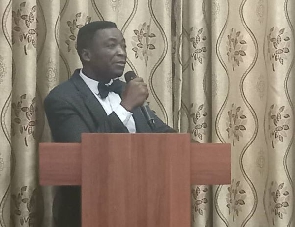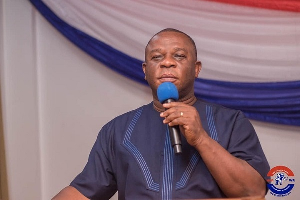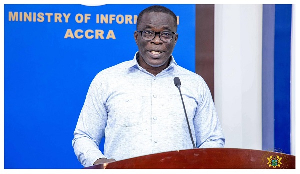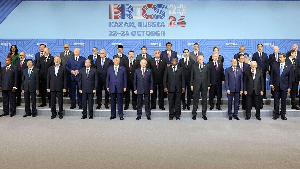In a thought-provoking lecture held on December 22, 2023, at the Council for Scientific and Industrial Research (CSIR), the president of the Distinguished Scholars of Africa (DISTINSA), Professor Nana Oppong, challenges the traditional understanding of economic development, proposing a bold addition to the established four factors of production: Authority Ignites Development.
For decades, economists have identified land, capital, labour, and management as the cornerstones of economic growth. However, Prof. Nana Oppong, argues that these factors alone remain inert without the driving force of authority by individuals, professionals, leaders, government etc to proffer solutions to the problems that has plagued humanity.
Addressing a diverse audience of high-ranking professionals, Prof Nana Oppong's lecture, themed "Authority as Humanity and as Currency for Democracy and Development," shed light on a crucial, but often overlooked element in the development equation; Authority.
He, however, lamented the ineptitude of Africans to contribute meaningfully to the innovation on the global front for the lack of exercise of their authority.
“We are incompetent. The culture of incompetence is exhibited by Africans at all levels and unless we become competent, we cannot be human, and unless we become human, we cannot be equal to anyone else.
“But what is the solution to the incompetence problem of the black race? It’s not slogans and the change of laws; it’s authority,” the renowned legal luminary averred.
He charged all to acquire sufficient authority in what they do as a measure to solve problems engulfing the continent and its people.
“If you’re a mechanic, a chef, a parent, a lawyer, a teacher, a politician, a doctor, if you don’t have authority to deliver on what you’re supposed to do, you will fail…,” he stated.
He stressed that, “the nations of Africa are failing and will continue to fail, unless they acquire authority to deal with issues and execute solutions that are sustainable.”
Prof Martin Gyambrah, President of University of Applied Management (Ghana) on his part emphasised personal and institutional authority as key tenets needed to benefit humanity, democracy and development.
He said, “Authority and responsibility are two of the most important components of any smooth functioning establishment or organisation. Authority is not unlimited power; it consists of rights and permission to act personally or on the part of an organisation or the people that legitimately handed the power to the person in charge.”
He observed that legitimate power or authority must evolve over time in response to the needs of humanity, for democracy and development to be relevant.
Dr. Victor Meme, Senior Associate partner with South African based MN Capital Advisory, making inferences to the scriptures, intimated that the existence of humanity is premised on authority.
He indicated that the Creator of the earth charged man to rule and have dominion over other creatures on the earth (Gen 1:26-31). He reinforced his position on authority with the story in the Gospel where a centurion challenged Jesus Christ to make his ailing servant well by mere utterance of words; a declaration that yielded instant results of healing on the servant (Matt 8:5-13).
He urged all to rightfully exercise God-giving talents which have been honed by knowledge acquisition to make an impact on humanity.
Speaking to the issue of authority as a catalyst of development, Dr Bernard Tetteh-Dumanya, a financial expert posited that, it’s imperative to build a clear path to inclusive progress. He stated that knowledge evolves with emerging trends hence the need for personal and institutional development.
“… the things we learnt three years ago could be obsolete now. That is why I agree with Prof. Oppong’s introduction of ‘Authority’ as a fifth element to the factors of production,” explained.
In furtherance of his point, he noted that a connection between authority, democracy and currency is essential to chart a path for development of the African continent.
“Authority is the mind of humanity in action on earth. But how is authority executed to propel development? It can either be enforced through democracy or military; with democracy being the preferred option,” he averred.
Ultimately, he called for a collective approach to development; where knowledge, competencies, and diversity are harnessed at all levels to positively affect change.
Prof. Nana Oppong's lecture concluded with a resounding call to action, urging individuals in positions of authority to wield their power responsibly and effectively.
With his groundbreaking proposition premised on his thesis, “Authority as The Superior Factor for Economic Paradise: The Global Scramble for the Most Important Factor in Economics,” Prof Nana Oppong has ignited a crucial conversation about the true engines of economic development.
His lecture rightly serves as a timely reminder that while land, capital, labour, and management are essential ingredients, it is the guiding hand of authority that transforms them into a potent recipe for progress.
As Ghana and nations across the globe strive towards economic sustainability, Prof. Nana Oppong's insights offer valuable guidance, urging all to harness the power of effective authority to fuel impactful and sustainable development for the benefit of humanity.
Business News of Monday, 25 December 2023
Source: Stephen Darko, Contributor

















